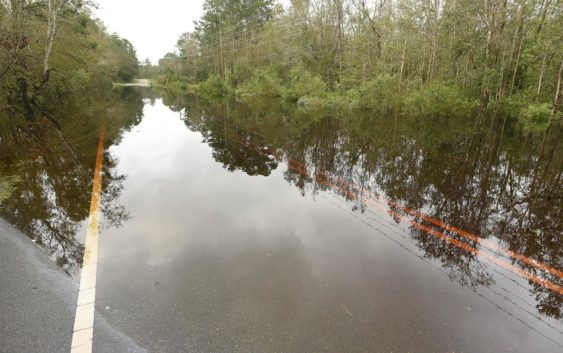- National memorial to honor NC firefighter who died on duty during Hurricane Helene
- Gov. Josh Stein extends State of Emergency for western NC wildfires
- Governor Stein extends state of emergency for NC wildfire threat
- Governor Stein extends emergency in 34 NC counties amid wildfire threat
- Texans can buy emergency preparation supplies tax-free April 26-28 ahead of severe weather season
Florence flooding taking a toll across Wilmington region

Rivers reaching record levels; evacuations ongoing; supplies in short supply
SOUTHEASTERN N.C. — Floodwaters reached record-high levels in Brunswick and Pender counties Monday as rainfall at the coast combined with rains inland, now flowing to the coast, created moving rivers of water across much of the region.
“It is probably going to be the most significant flooding event the southeastern part of the state has ever seen,” said Wilmington Mayor Bill Saffo Monday.
The Northeast Cape Fear River near Burgaw stood at 22.48 feet Monday morning, virtually tying the 22.5 foot record set during Hurricane Floyd — and it is projected to continue rising until it reaches 24.2 feet, cresting on Thursday. Impacts are expected to include flooding on 12 miles of N.C. 53, as well as in subdivisions such as River Bend, River Birch and Alligator Lakes
In other parts of Southeastern North Carolina, slow-moving floodwaters left road after road and neighborhood after neighborhood inundated.
Rick Neuherz with the National Weather Service’s Wilmington office said Hurricane Florence had dropped 23.2 inches of rain on the Port City so far — with some remnants of the system still liable to dump more precipitation on the water-logged region.
“That is record-breaking for any tropical event we have on record,” he said. “For people who have been here for awhile and saw flooding during Hurricane Floyd, they need to start thinking about seeing that again.
“I don’t know levels, but this will be worse than Floyd.”
Floodwaters — still rising in some areas — were making it difficult for rescue personnel to move supplies and people. Although heavy rains had stopped Monday morning, the weather service warned that additional rain will likely cause additional flash flooding.
In the last 44 hours, a weather service gauge on the Black River at N.C. 210 had risen from 4.36 feet to 14.55 feet. The weather service believes the river will likely flood more severely during Florence than it did during Hurricane Matthew in 2016.
Pender and Brunswick woes
In Pender County, with the Northeast Cape Fear and Black rivers still rising and many parts of the county cut off due to flooded roads, emergency officials told residents to watch out for rescue helicopters.
“Watch and listen for helicopters,” stated a Facebook post from the Pender County Emergency Management. “Upon observation of the helicopter, go outdoors and signal for your rescue using a towel, flashlight, flare or whatever you have available.”
Randall Woodruff, Pender County’s manager, said crews have rescued 500 people in a 36-hour period. Monday morning, there were six helicopters in the air over Pender conducting air rescues and five-ton high-clearance trucks conducting similar efforts.
The county’s warning to conserve water remains in effect, as it doesn’t have enough diesel fuel to keep pump stations running, Woodruff added. The state, he said, is going to try to send inspectors to check on bridges in the next day or two to determine if the county can receive shipments of food and fuel from the outside.
Brunswick County is also suffering from significant flooding. Rescue crews are conducting searches in the Boiling Spring Lakes area in order to make sure it is fully evacuated.
And Southport is cut off by supplies over land, so emergency personnel are doing aerial drops of fuel, food and water. Furthermore, Dosher Hospital in Southport is receiving a tanker of water via ferry from New Hanover County and another tanker from Brunswick Hospital via high-water vehicles.
Heat coming
For New Hanover County, the flooding appeared largely to be dissipating. But the disappearing waters were leaving a trail of destruction behind them.
Officials Monday said 81,000 customers remained without power, and there had been more than 700 rescues.
With clean-up efforts underway — but still a long way from completion, New Hanover County Chairman Woody White said this wasn’t the time for evacuees to begin returning to the coast.
“We will tell you when it is time to come back,” he said. “It is not now, it has not come yet.
“Please stay where you are.”
And although the rains were stopping, Mother Nature also had one last surprise for the region’s tired and disaster-weary residents.
The weather service warned the heat index could climb to nearly 100 degrees in some areas later this week, leaving older people or those with health conditions vulnerable to heat stress.
Reporter Adam Wagner can be reached at 910-343-2389 or Adam.Wagner@GateHouseMedia.com.
.embed-container { position: relative; padding-bottom: 56.25%; height: 0; overflow: hidden; max-width: 100%; } .embed-container iframe, .embed-container object, .embed-container embed { position: absolute; top: 0; left: 0; width: 100%; height: 100%; }